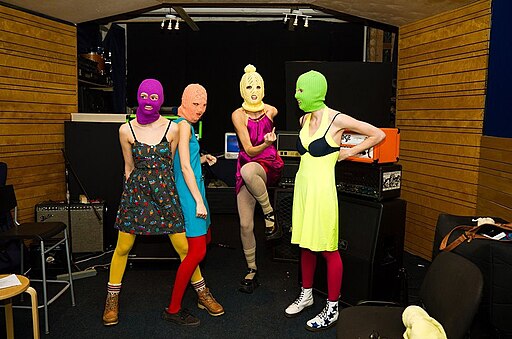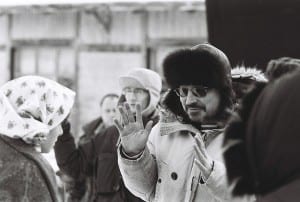How far has culture become a frontline in Russian politics? And how does it compare to earlier periods in the country’s history? Artemy Troitsky, Peter Pomeranstev and Oliver Carroll discuss the nature of art, protest and the absurd in contemporary Russia.

Photo: Denis Bochkarev via Wikimedia Commons
Oliver Carroll: From Voina to Bykov, Pussy Riot to Moscow hipsterism, culture seems to be playing a very political game in Russia. How can we explain this? Is this something that Russia has seen before? Are we witnessing this Russia’s ‘1968’ moment? And if so, is accompanied by the same kind of generational and political splits that we saw in Europe’s rebellion? Or is it something completely different?
Artemy: If this really is a cultural revolution, then I’m afraid it happening on a very small scale. Compared to the first decade of the 21st century, which was absolutely lethargic and comatose, Russia’s cultural life and political community has started to show some life. But compared to the kind of cultural euphoria Russia experienced in other times — during the so-called shestidesiatniki movement in the late 1950s and early 1960s, or in late 80s during Perestroika and Glasnost — it’s on a much smaller scale.
The saddest thing of all is that today’s cultural developments are much more elitist, touching a much finer layer of Russian people than either of the earlier cultural thaws (ottepel). The cultural movement back then was simply massive, supported and followed by millions of so-called ordinary Russians. What is happening right now is more a minority movement, largely ignored by the majority of the Russian population. And there is also a strong counter-reaction too. Sure, Glasnost had some some reactionary things like Nina Andreeva writing her letter in Sovetskaia Rossiia, or the Stalinist writers who urged people not to give up on their principals. But they were the tiny minority. Right now it’s us that feel as if we are pushed in the corner.
OC: Peter, you lived in Russia throughout the 2000s, the least political moment of modern Russian history. You were also in Moscow at the end of that decade, which was when the political returned with some vengeance. Do you agree with Artemy that such change is pretty much insignificant, at least when compared to the 1960s and 1980s?
Peter: Everything in Russia is insignificant compared to the 60s and 80s. Everything in Russia seems to have shrunk and become an echo of when it was truly important. I think Artemy is completely right here, but it’s very interesting to look at the detail of what’s happening, because it’s a slightly different type of battle.
In Soviet times there was a Soviet culture and a dissident culture. Today, things are less distinct. Over the last few days I’ve been meeting some people from Nashi, for example. I was quite surprised to find out their aesthetic is hipster. They love manga movies, they like modern arts, they have actually co-opted a sort of Western style into their language and then completely twisted it and married it to patriotism and quasi-fascism. In the past, the Kremlin was also sponsoring the most radical art projects, like Kirill Serebrennikov’s Territoriya festival. They went out of their way to make sure that there could be no cultural rebellion by co-opting that language and making it part of the system. Making it pointless as well in the process.
What I’ve been seeing the last eighteen months in terms of culture and in terms of language is an attempt by the opposition to create a mini world for itself, a place where it is not contaminated by the meddling of the Kremlin. And I think that’s incredible and quite inspiring. It’s not a battle of us against them, it’s a battle between manipulation and integrity, and a search for a new language. So it is a much more subtle war then it was in the 1960s and 1980s, when it was almost a Napoleonic war. This is more like the Cold War, with some skirmishes around the edges, spies meeting each other in the culture wars. It doesn’t mean it’s not important, just much more subtle and playful.
A: I think some of the things Peter is saying refer to the previous decade, not necessarily today. During the 2000s there was an obvious and quite successful pact with the regime: ‘We guarantee you a certain degree of stability and prosperity; you can buy your Korean car and go on holiday to Egypt’. In the business community it was, as Mr Putin himself put it, ‘pizdit’, no ne pizdet’’ (‘steal as much as you want, but keep your mouth shut‘). And a similar kind of pact was signed with the cultural elite: do whatever you want, any kind of artistic experiment, sex, drugs, violence… You want to make movies that make Quentin Tarantino look like the Muppet Show? Go for it… And again the cultural elite said ‘Yeah that’s fine, that’s fantastic’. (more…)
Filed under Uncategorized
Tags: Aksana Panova, Andrei Loshak, Artyom Loskutov, cinema, culture, film, Kirill Rogov, Kirill Serebrennikov, Nashi, Pussy Riot, Putin, Russia, shestidesiatniki, Vladimir Putin, Vladimir Zhirinovsky
No Comments »
 Close
Close



